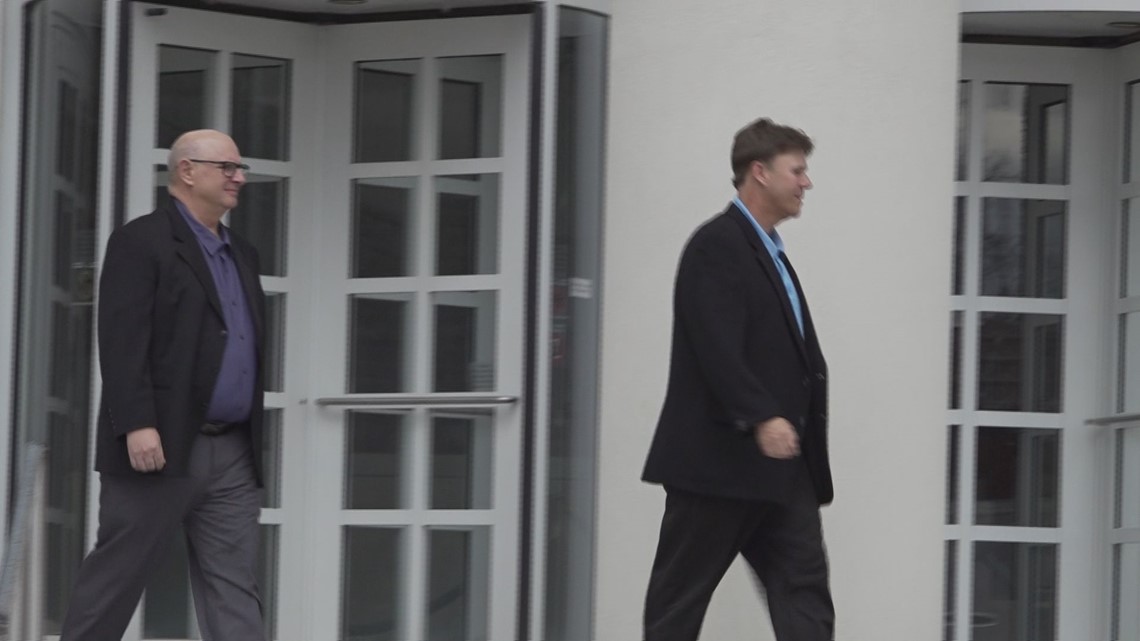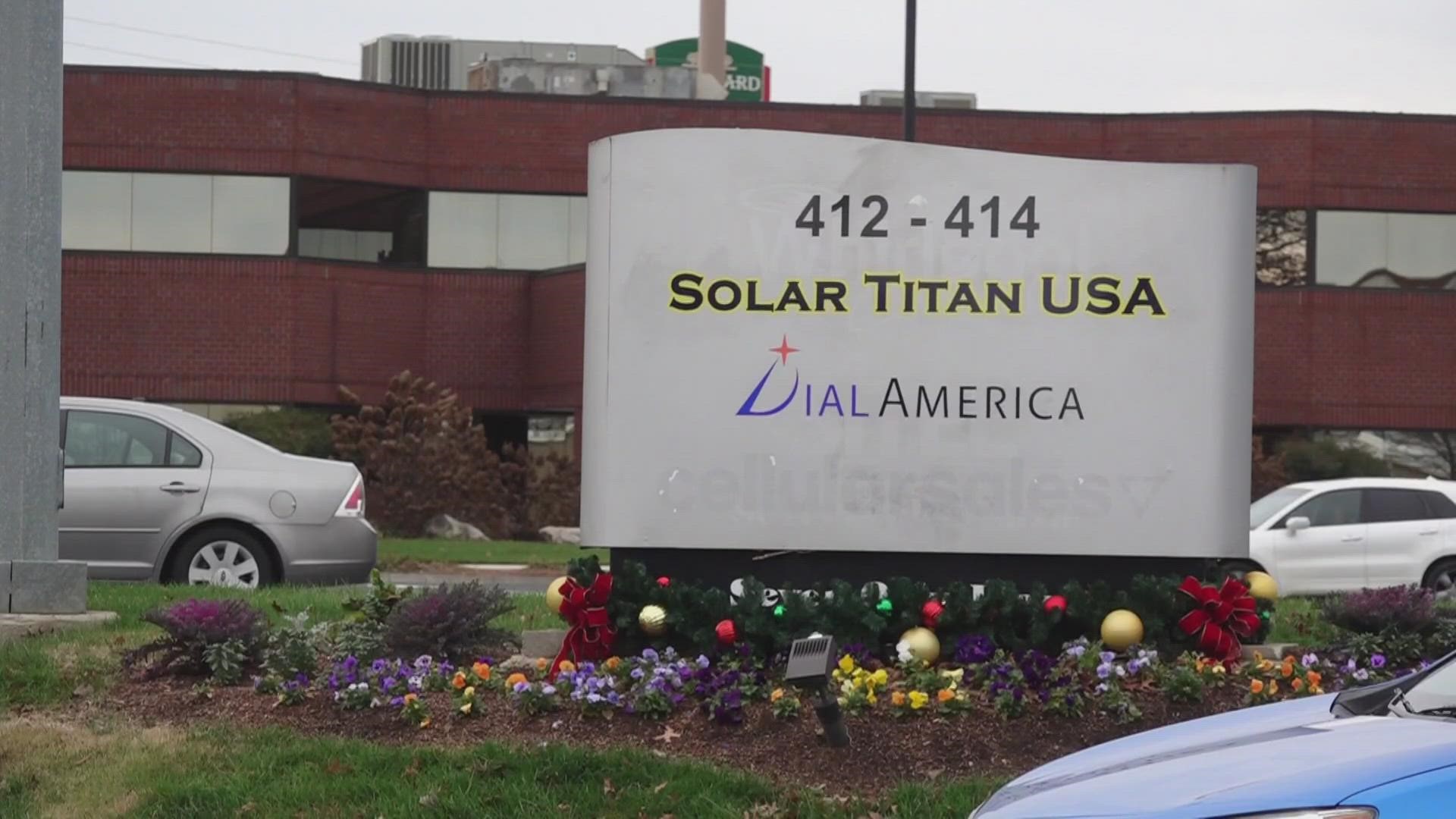GREENEVILLE, Tenn. — Update March 1:
Judge Clifton Corker issued a new ruling Tuesday, converting the temporary restraining order into a preliminary injunction.
He said the plaintiffs are likely to succeed on the majority of the claims in his 38-page order.
With regards to the Consumer Financial Protection Act, he said it is "unlikely that Plaintiffs will succeed on the merits of their CFPA claim based on the assertion that Solar Titan misrepresents consumers’ eligibility for the tax credit."
However, he said they are likely to succeed on their claim that the plaintiffs violated the CFPA with regard to the loan start date.
"Solar Titan’s acts or practices in the provision of financial services are unfair, deceptive, or abusive due to the omission of material information, which leads consumers to believe they will not be obligated to pay on their loan until their solar system is operational," he wrote.
He also said they are likely to succeed on their claims that Solar Titan violated the Consumer Review Fairness Ac, as well as the Consumer Protection Acts and Home Solicitation Sales Acts in Tennessee and Kentucky.
He said Solar Titan's three principles — Richard Michael Atnip, Craig Kelley and Sarah Kirkland, knew or should've known what was happening with the company.
"Thus, Plaintiffs are likely to succeed on the merits of their claims alleging personal liability for consumer protection violations against each of the Individual Defendants," Corker wrote.
Original Story:
On Monday, Charles and Elizabeth Watson listened intently to the debate inside the United States Courthouse in Greeneville.
The Solar Titan customers are hoping they'll get some kind of relief for the $34,000 solar power system they bought in September 2022.
"We have a system that hasn't been tested or worked," Elizabeth Watson said. "Everybody's out money. We were misled when they came out to our house."
Tennessee Assistant Attorney General Samuel Keen explained how the company was in "dire financial straights." He said the company had been evicted from its Knoxville headquarters off Peters Road after falling behind on payments.
Keen said the company was missing payroll and had intended to file for bankruptcy after multiple sales of the company had fallen through. Some of the company's assets were being sold to Texas Solar, he said.
The plaintiffs argued both Richard Michael Atnip and Craig Kelley were personally liable for the company's problems under Tennessee law.
He said Atnip knew or should've known what was happening with the company he owned 90% of. The list of examples he gave included Atnip responding to 10Investigates' requests about the state of the company.
Keen argued Atnip controlled disbursements, bound the company in agreements, was a signatory to the bank accounts and responded to at least one consumer complaint.
Keen said Tennessee law states that each member has equal rights in management and conduct — an authority he delegated to his husband, Craig Kelley. He said that "wasn't reasonable" because of Kelley's history of financial misconduct.
He also said Atnip took out a loan for roughly $2.75 million in 2021 to start Titan Charters, a company that had no clients besides Atnip, Kelley and Sarah Kirkland. Keen said him "reinvesting" $3.6 million into the company was paying that loan back.
Kentucky Assistant Attorney General Paul Fata explained why his office believes Kentucky law applies and why Atnip and Kelley should be held personally liable.


Fata said Atnip continuously misrepresented himself as the company's primary operational manager, including to their office, and that Kelley reported to Atnip.
Fata argued the profits Kelley and Atnip earned was "money derived from unlawful business practices," and that the "vast majority" of their assets — which total more than $10 million — were "purchased with funds from Solar Titan."
He said he asked Atnip whether his tax returns from 2019 to 2021 were accurate during a deposition on Friday and Atnip invoked his Fifth Amendment rights. Fata said he took that as a "negative inference" because it's a civil matter.
Atnip's attorney, Bill Killian, said he instructed Atnip to plead the Fifth during the question about his tax returns because an accountant prepared them.
He focused on how Solar Titan became profitable by "defrauding customers." Therefore, he argued their assets were tainted and should go towards making customers whole again.
He also said there was "not a single shred of evidence" suggesting Generac is the reason for Solar Titan's troubles.
Kelley's attorney, Stephan Wright, said the state blamed "the company" more than the "the principles." He said he didn't believe his client should be liable for what happened.
"Solar is hot — literally on fire from a business perspective," he said, adding that their intention was simply to install solar panels.
He said they installed between 2,500 and 3,000 solar systems from 2019 to 2022. Wright said they had between 200 and 300 complaints, or roughly 10% of customers, which he said wasn't out of the ordinary.
He said they had only 20 days to prepare "moderately competent briefings" compared to the six or seven months Tennessee and Kentucky spent investigating.
"We don't control Solar Titan anymore," he said, adding that no one is questioning the decision to place Solar Titan under the receivership of Richard Ray.
He said the company was valued at $160 million in early 2022 and that the 2021 tax return showed $42 million in revenue, with $8 million in profit after distributions.
Wright said the company simply couldn't overcome the issues it faced with the SnapRS product from Generac.
"Maybe [Solar Titan] didn't have the strongest managers. Maybe it had too many cooks in the kitchen," Wright said. "You had the wrong people on the bus, but it doesn't mean the bus was a draw."
He said the disbursements Kirkland, Atnip and Kelley received weren't improper and happened while the company was "sufficiently profitable."
"That level of wealth doesn't mean it's wrong," Wright said.
He said Kelley and Atnip have been together for 34 years. He said Kelley is not an innocent bystander and did have knowledge of what was happening with the company.
Wright said Kelley's wire fraud conviction from Nevada is more than 10 years old and should not be held against him under federal evidence rules.
They "really built a good company," he said. "It just got too big too fast."
He said he hopes the receiver is able to "salvage" Solar Titan.
Atnip's attorney, Samuel Blink, also argued the asset freeze was "government overreach" based on "less than credible witness testimony."
He argued Generac was "too much for Solar Titan to handle" and "created cash flow issues." Blink also discussed why he felt Atnip should not be held liable.
Blink said the majority of Atnip and Kelley's assets are real estate and are therefore not in imminent danger of being lost. He said there is not proof of individual fraudulent conduct and that the plaintiffs have "grossly overstated issues."
He said only 8.5% of customers had raised concerns and many of those had only made a handful of payments.
He said he didn't support any asset freeze, but felt freezing a commercial property in Knoxville valued around $1 million would be more appropriate.
He suggested going "after entities with larger pockets," such as Generac and/or Solar Mosaic.
He said the asset freeze is doing more harm than good.
Atnip's other attorney, Bill Killian, said Solar Titan had a robust training program with videos that haven't been requested. He said they spoke with Solar Titan's former CFO, who said there was "nothing done to justify extraordinary relief."
He said he didn't believe every consumer complaint was "valid" and thinks $2 million worth of properties would be sufficient if the asset freeze were to continue.
Sarah Kirkland and her attorney did not testify on Monday because they had previously worked out an agreement that granted her access to $34,000 in a series of payments over the next four months. One of her accounts will remain frozen; the others will be placed into an account that her attorneys control.
Attorneys for Solar Mosaic and Volunteer Ventures were also present but did not testify because Monday's matter was not about their respective parties.
In his rebuttal, Tennessee Assistant Attorney General Samuel Keen said he did believe there were fraudulent transfers because money was taken out while contractual obligations were going unfulfilled.
Judge Corker asked if the asset was overkill. Keen said no due to the "magnitude of harm." He said it's very rare to have 450 complaints against one company.
He estimated the average cost of the systems was $40,000 and customers could have the right to cancel because they weren't given proper notice.
In his rebuttal, Kentucky Assistant Attorney General Paul Fata said the 10% estimate of customers with issues is inaccurate because complaints keep pouring into his office.
He believes the problematic systems sold in Kentucky could be worth close to $10 million or more because the customers are responsible for the full balance of the loan, not just what they've paid so far.
He said the defendants could also face financial penalties for violating Kentucky laws.
Fata said more than half of the complaints he's reviewed list problems that are explicitly not related to Generac. He said Solar Titan has no money "because the defendants took it."
He said they made the profits in the first place by "unlawful business practices."
Judge Corker said he intended to make a new ruling before the temporary restraining order and asset freeze expired on February 28. On Tuesday, he ruled that the temporary restraining order entered on Feb. 7 would be covered into a preliminary injunction.
It barred Solar Titan and the defendants from "making, or assisting the making of, expressly or by implication, any false or misleading statement" regarding how solar systems will impact homeowners' electricity bills, or if consumers will benefit from net metering or a government buyback program.
It also requires them to allow sales agreements to be canceled if a customer asks for it within a certain amount of time. It prevents the company from claiming consumers can't negatively review them online, or enter into installation agreements without the ability to provide services.
The injunction also freezes the assets of Solar Titan defendants, except for four bank accounts owned by one of the defendants. They will also need to deliver completed financial statements to their attorneys.
The judge also ordered that Ray continues as the receiver of Solar Titan, who can remove executive staff or employees as needed and maintain control of the company's assets. He would also need to secure each location that Solar Titan operates from, and will need to obtain all of the company's information technology.
He will also be responsible for providing Atnip and Kelley $3,500 per month to provide for reasonable housing and other living expenses from their frozen assets.
The defendants will need to provide a list of all assets, property, agents, employees and officers of Solar Titan. They will also need to deliver Solar Titan records, assets, computers, and any passwords needed to access them.
Investors, creditors, stockholders, lessors and customers are also enjoined from taking action against the company if it would interfere with the court's jurisdiction.

